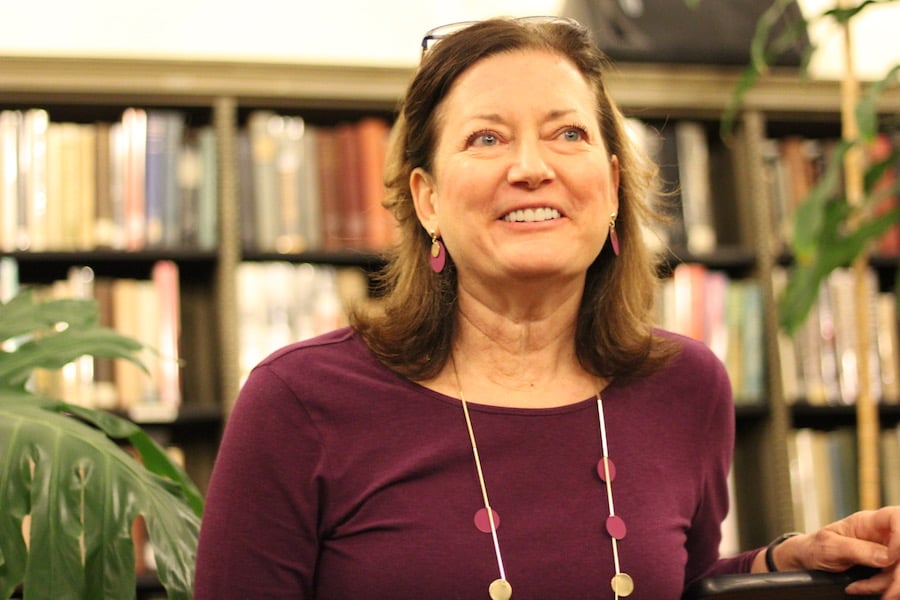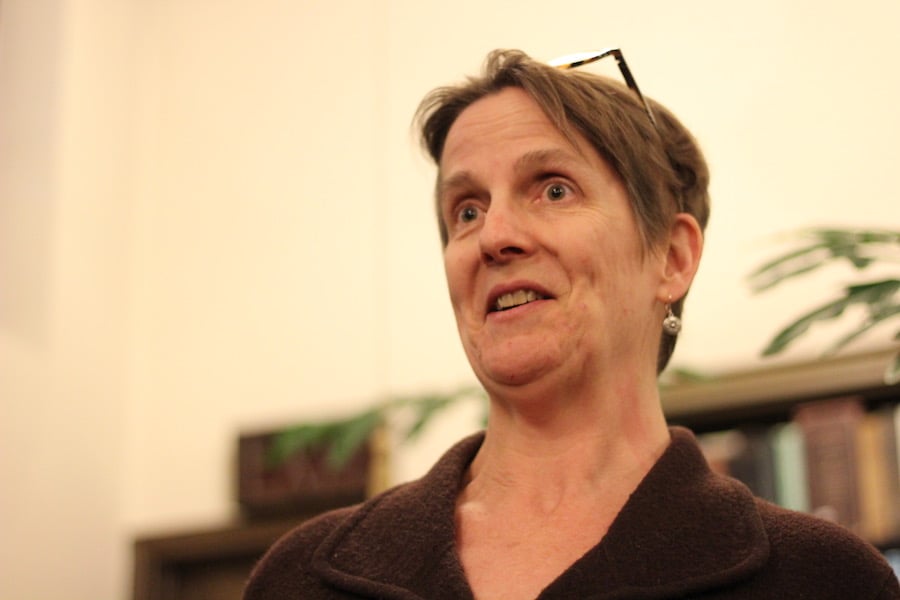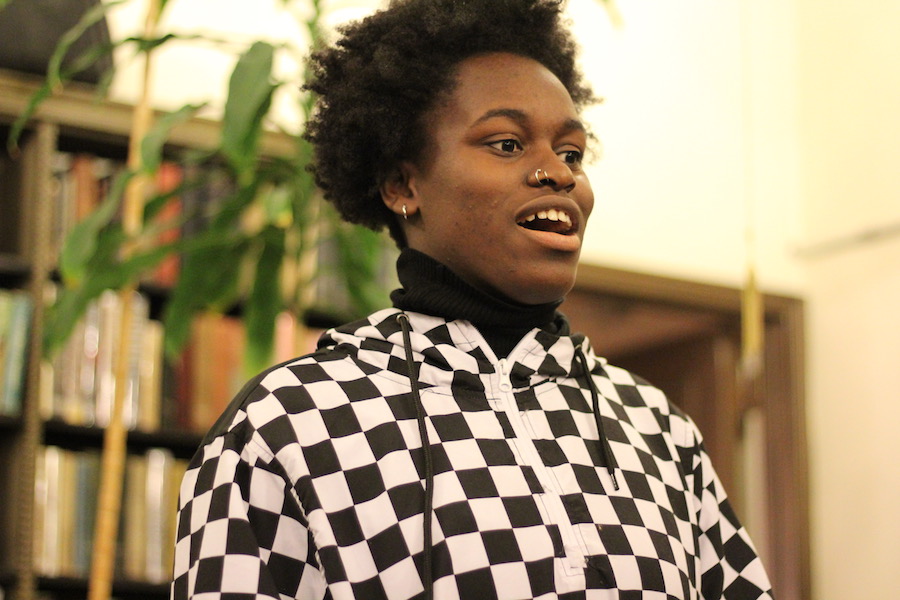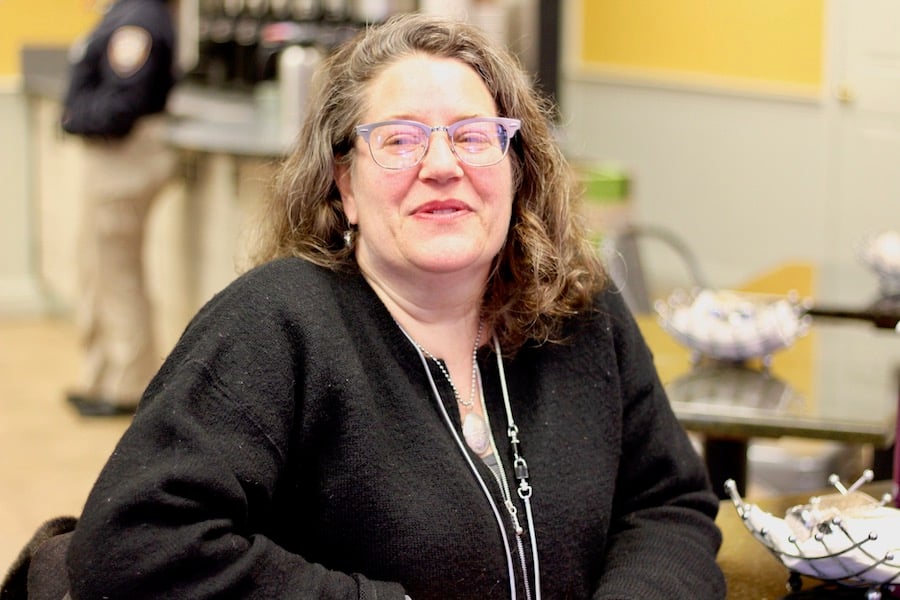
Books | Institute Library | Ninth Square | Arts, Culture & Community

| Board Chair Maryann Ott at Wednesday night's meeting. Lucy Gellman Photos. |
Rearrange finances by slashing the budget. Replace full-time staff with a part-time operations manager, and let the board absorb the rest of the work. Stop dipping into the endowment. Find hundreds of thousands of dollars to mend the roof, fix skylights, and tackle water damage. And get ready for a kind of big shrink—all in the hopes of expanding again soon.
That message hit the Institute Library (IL) Wednesday night, as board leadership, IL volunteers and members, and members of the general public gathered at the Chapel Street organization for its 2019 annual meeting, an announcement of new board membership that turned into an impromptu progress report on how the library is moving ahead.
The event comes just a week after the board announced a major restructuring intended to save the organization and the building from financial distress (read the full email here). On Jan. 11, the library bid farewell to Executive Director Valerie Garlick, eliminating the position eight years after it was created. Then on Jan. 14, it welcomed longtime member Eva Geertz, who has served extensively on the organization’s board, as a part-time operations manager.
Geertz said she plans to give the position, in which she is working 20 hours per week without benefits, a six-month trial period. In the absence of an executive director, board members have volunteered to take on fundraising and grant writing responsibilities themselves.
The most pressing concerns are costly building repairs and ongoing operations expenses. For years, the IL has needed to address water damage, vintage skylights, and a sagging, leaky roof, preliminary estimates for which are in the $300,000 range. While part of those annual expenses are covered by Carol Orr’s vintage shop Civvies downstairs, that only accounts for a small percentage of what the space will have to do.
As the board cuts back the budget, Board Chair Maryann Ott estimated that annual operating expenses will go from $225,000 to $87,000 to $90,000. That includes a vow not to dip into a $309,000 endowment, which has shrunk to a mere fraction of what it once was in the past 20 years.
“We are working really hard to keep this institution going, and to facilitate it reaching its full potential,” Ott said at the meeting. “And then in the meantime, we have this building. A building that was neglected for a long time … all these things have had band-aid after band-aid put on them, and it’s come to a point where we can’t continue responsibly to do that. That we have to face the challenge of the roof.”

Wednesday night, Board Member and Architect Laura Boyer (pictured above) clarified that the roof is “way, way, way, way past its lifespan,” with energy and HVAC concerns “at the top of the triage.” Left to deteriorate for decades, the roof is now sucking in water, with masonry that requires immediate stabilization and old skylights that will have to be dealt with. There’s also water damage in the walls and old windows.
While the board also has its eyes on an elevator—the building is currently not ADA accessible—that will have to wait until the roof and water damage is repaired. Currently, members are looking at historic building dollars from the State Historic Preservation Office (SHPO) among other grants.
“The logistics probably double the complication, and it’s not an easy project to begin with” said Boyer, who has a background in historic preservation. “You can’t just chip away at it—we’re having to break away such a small part because it’s in such bad condition that it’s really an emergency. But it’s really one of those projects where … you’ve just got to go for the whole thing.”
“It is happening behind the scenes, you’re just not seeing it right now,” she added. She said that in the best case scenario, the soonest that the library will close for construction is 2020.
While that means the IL will close at some point in the next two years, community activities including Story Sharing, Listen Here!, the Poetry Institute and The Word are set to continue, in part because they are all run on a volunteer basis.

She added that in some ways, these changes have actually been years—if not centuries—in the making. Established as the Apprentices Literary in 1826 —that name was changed to the Young Mechanics Institute in 1828 and again to the New Haven Young Men’s Institute in 1840—the IL found its first home at 135 Orange St., paying $13,000 for the historic Palladium building that is now becoming luxury housing.
It fell on some lean times then too: first at the end of the Civil War, when a dwindling membership from deceased soldiers meant that it had to sell its building, and was effectively homeless for several years (it moved into its current space, designed by the architect Rufus G. Russell, in 1878). Then again during both WWI and WWII, after the second of which the library witnessed plummeting number, and flight to the suburbs.
By the end of the twentieth century, Ott said that it was in “a bit of a dormancy phase,” staffed part-time by two librarians who “were really keeping the doors open and keeping the library running.” By then, the building had also begin to fall apart—board members and staff fell into a trend where “band-aids were put on problems” including leaks and growing damage to the walls (paint and plaster are now peeled away in whole sections). During the week, the library hummed away as a well-kept secret on Chapel Street, failing to attract new faces. And at some point, board members realized that that they didn’t want it to be a secret anymore.
In the early 2000s, members began talking about what it would take to have a full-time position dedicated to fundraising, community outreach and programming, member recruitment and more. Ott said those discussions were spurred in part by the 2008 financial crash, in which the board withdrew funds from the endowment just to keep the building running. Between 2000 and 2010, it shrank from $1.35 million to $322,000. Or as Geertz said, “things got super scary.”
The organization’s hours shrank. Geertz, a book buyer who was by then a board member, brought it to their attention that they were “acquiring books in a completely inefficient way.” And the board made a decision that if the IL was going to survive for another 150 years, as it had already, it was going to need some kind of new leadership.
In 2011, the IL hired Will Baker as its first executive director, a position that Ott said was based on a "leap of faith" and ran the organization about $65,000 per year including salary and benefits. Baker, a rare book dealer with a master’s degree in library science, expanded programs, bringing in new community partners from the New Haven Public Schools, LGBTQ+ and spoken word communities.

| Salwa Abdussabur, who proposed opening free membership to organizations that use the space. |
He resuscitated a third-floor upstairs gallery space, cleaning a trash- and soot-stained room into a hidden-away haven for local artists. He wrote grants and attracted new members and donors, spreading the gospel of the IL in neighborhoods that didn’t reflect its historic membership base. He expanded programs at the library, working with local author and pit-master Jack Hitt to curate a monthly Amateur Hour series that often packed the house.
“Will had a completely enchanting way about him,” recalled Geertz, who had initially been the one to introduce Baker to the library. “He was this upright Midwesterner … but behind that veneer he was just this complete maniac—beyond open-minded. It was super refreshing.”
But it was also a stretch for the institution. Wednesday, Ott recalled that Baker kept coming to the board “all along the way,” telling members that he was working 60-hour weeks and needed more help. They didn’t have the capacity for another staff member. Baker left for Pittsburgh in 2014 (he now runs W.C. Baker Rare Books & Ephemera in Brooklyn), passing a newly-alive institution to Natalie Elicker.
By then, board members had also been working on new fundraising activities, including an annual Book Plates authors series and backyard pig roast that has since been discontinued. During her tenure, Elicker committed to raising building funds and growing community partnerships, adding concerts and other cultural happenings to an already-full schedule of events. She pulled in funds from the state’s Department of Economic and Community Development intended to address the building’s centuries-old growing pains.
Briefly, she brought on a part-time, grant-funded operations assistant, a position that Ott said ultimately wasn’t sustainable. But when she left in 2016 for a job with the U.S. Attorney’s Office, the position remained unfilled for months, an operations manager acting as a stopgap before Garlick took over that fall.
Garlick took over in 2016, focused on community outreach, expanded exhibitions, and much-needed care for the building. While there, she grew the space’s third-floor gallery, bringing in quirky, conceptual exhibitions from curator and artist Martha Willette Lewis. She nearly doubled the IL's membership and sought to find funds directed at historic preservation, as she had while addressing water damage at at The Carriage Barn in New Canaan. Then in December, the board notified her that they were eliminating the position. Her final day was Jan. 11. Six volunteers left with her.
“It seemed like the most responsible thing we could do was reduce our operating expenses and retract a little bit,” said Ott in a phone conversation before Wednesday’s meeting. “The way this library has survived for 194 years, from wars to depressions and everything else, is because it’s been agile enough to contract and expand.”
“It wasn’t an easy decision, but it seemed like the responsible one,” she added of Garlick’s departure, noting that she was sad to see Garlick go. She said that the board has not ruled out reinstating the position at some point in the future, but will not be considering that option for at least another one to two years.
New Job, Old Stomping Grounds

| Eva Geertz: “I kind of felt like if I didn’t do it, I was a giant asshole.” |
For almost two decades, Geertz has watched that history unfold, and advised board members on several operational and financial decisions at the library. In 2002, she received membership as a wedding gift from Chris Arnott, then a writer for the New Haven Advocate who is now a theater critic for the Hartford Courant. The membership card came in a little box with an ink pen, like some relic of a bygone era.
“I ambled over and it was just amazing,” she recalled in a recent interview at Zoi’s. “At the time, the place was sleepily chugging along. I would go over, borrow books and hang out. It was basically a really sleepy, not culturally ambitious place.”
In those years, books were already in her blood: she was an acquisitions assistant for the Beinecke Rare Book and Manuscript Library at Yale, and then worked as a cataloguer and book buyer for P&B Books and Atticus cafe and bookstore downtown. The library’s quiet suited her, she said. “It was magic.”
In 2005, Geertz started attending board meetings, where it soon “became clear to me” that the place may have been magic, but it was also a snapshot of financial mismanagement and inefficient practices, from general administration to book buying. By 2008, expenses were bad—and she had a sense of how to salvage them.
“So I spoke up,” she said. The board asked her to come on formally—timing that ended up working because she lost her job in the financial crash. She had time to devote to the library, often bringing her young daughter with her as she headed downtown to sort out the institution’s financial woes and sat through board meetings. It was her spot: the place where she was at home, the place where her kid was growing up, the place she was helping save.
In those years, she also met Baker, taking him on his first visit to the library right around the time that her daughter was born. Soon, she was watching him turn the library around and stepping in where she thought she could help. She praised both his and Elicker’s leadership styles, recalling that she knew Elicker would be okay when she walked past her Orange Street home after a storm, and heard that she was dealing with a porch that had just caved in.
“She was just cool as a cucumber,” she recalled, noting that she made herself available to give advice and pitch in whenever she could.
Geertz stepped down from the board in 2017, after Garlick was hired. But she kept her fingers on the pulse of the library, attending events when she could make them, and staying in the loop with members. So when board representatives asked her if she would ever be interested in working there, she thought they were talking in fairly broad terms, and well into the future.
Then they offered her the part-time position. For January. And Geertz, who both loves the library and is also a landlord and has been worrying about finances since the city’s 11 percent tax hike last year, said yes.
“It all happened very quickly,” she said. “I kind of felt like if I didn’t do it, I was a giant asshole.”
As operations manager, she said that she will be answering email, opening bills and balancing books, making sure expenses are paid on time, greeting existing and potential members, and taking care of the building. On a given day, that may include mopping water that has come in from the roof, fixing a plumbing snag, or finding a temporary fix for new condensation on the walls.
She said she envisions the role as “kind of Mary Poppins-like,” referencing the original books by P.L. Travers in which Mary Poppins comes and goes intermittently, creating order in for the Banks family that then dissolves in her absence.
“It will restore a sense of day-to-day clam there, eventually,” she said. “I don’t think the library is on the cusp of closing. I think the library will just go into rest mode. Like, it needs to go into the hospital and have a hip replacement or something.”
“The library has had much worse times than this,” she added. “This is just an inconvenient glitch.”
What Comes Next

Since announcing the restructuring last week, Ott said there has been “an outpouring of support,” including several unexpected donations to the library. Last week, an anonymous donor stepped forward with funds to cover the next three months of operating expenses, as well as a chunk of money for the roof, and another small sum for new book acquisitions. The library has also received $21,000 from Wells Fargo, and a number of smaller donations intended to keep the lights on.
“I think it just reinforces for all of us that we’re on the right track, and this contraction of the library is in no way permanent,” Ott said.
Part of that is a dedicated board who will keep the institution going. Wednesday night, seven current board members voted in Mountaga Diallo, the area manager at the downtown branch of KeyBank who will act as treasurer, and Eileen Mydosh, a clinical pharmacist at Yale-New Haven Hospital and longtime Listen Here! attendee. From the floor, Victorya McEvoy also nominated Salwa Abdussabur, permitted through the organization’s bylaws.
Abdussabur said they are interested but need time to think about it. Both Ott and Vice Chairman Susan Davison said they will be in touch with them in the next weeks, per a tradition of potential board members meeting with current board members before they are voted in.
Now, some members are wondering where the IL goes next—even if that next is a contracted period. As Ott opened the floor to questions, hands went up around the room.
“I’m wondering if there’s an offer for organizations that are a part of this to be welcomed in as members automatically,” said Abdussabur, a facilitator for The Word who recalled growing up in the Institute Library because her dad, retired top cop Shafiq Abdussabur, had a membership. “To recognize the great lack of diversity in this space, I think it would be dope if it could go from being its best-kept secret to being more well-known in the community.”
Ott said that while the board hasn’t considered that—they’re not in a position to grow community outreach, she maintained—both she and Davison have been considering the option of a free six-month trial membership, for community members who aren’t sure if they want to join.
“It seemed to me like there has been a lack of communication between the board and members,” said filmmaker Lisa Seidenberg, a member who has exhibited her work in the library’s upstairs gallery. She recalled a community relations committee that Garlick had assembled when she began her tenure, noting that she missed seeing her at the front desk. “It seems to me like you’re ignoring a great resource by not reaching out to the members.”
Ott nodded, promising Seidenberg that that she was listening.
“I’m just gonna ask you to give us a moment to catch our breath,” she said.

